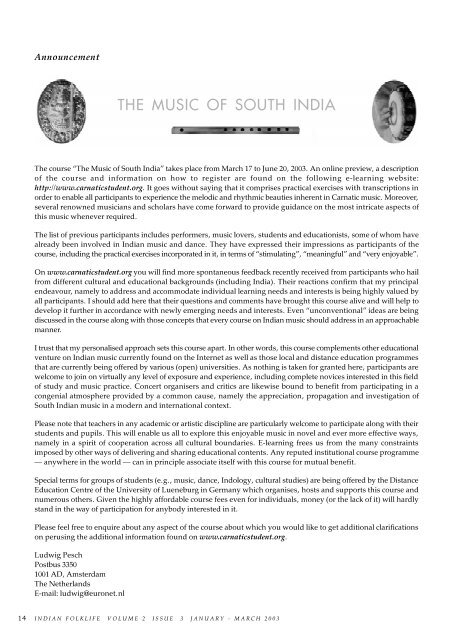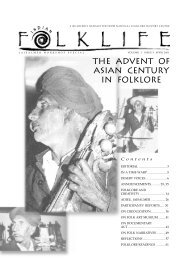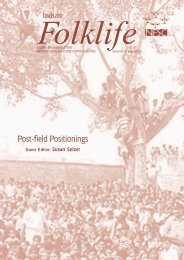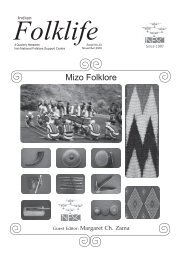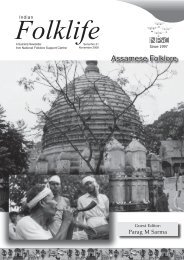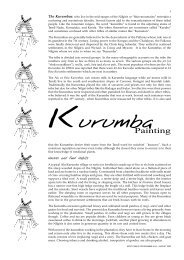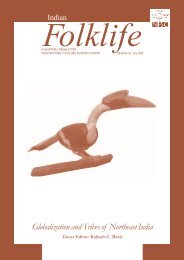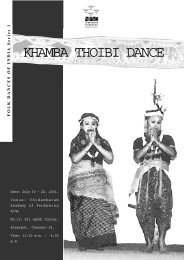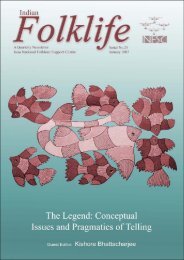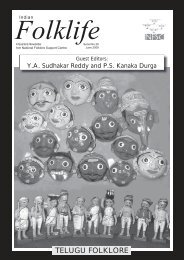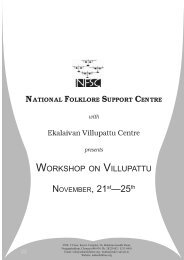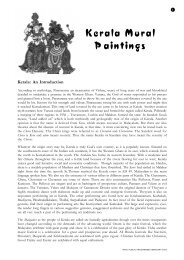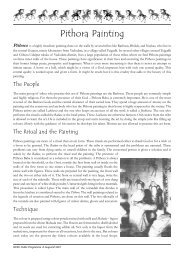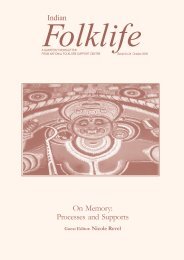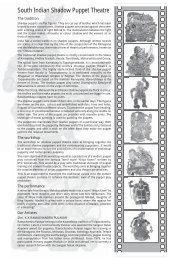AnnouncementTHE MUSIC OF SOUTH INDIAThe course “The Music of South India” takes place from March 17 to June 20, 2003. An onl<strong>in</strong>e preview, a descriptionof <strong>the</strong> course and <strong>in</strong>formation on how to register are found on <strong>the</strong> follow<strong>in</strong>g e-learn<strong>in</strong>g website:http://www.carnaticstudent.org. It goes without say<strong>in</strong>g that it comprises practical exercises with transcriptions <strong>in</strong>order to enable all participants to experience <strong>the</strong> melodic and rhythmic beauties <strong>in</strong>herent <strong>in</strong> Carnatic music. Moreover,several renowned musicians and scholars have come forward to provide guidance on <strong>the</strong> most <strong>in</strong>tricate aspects ofthis music whenever required.The list of previous participants <strong>in</strong>cludes performers, music lovers, students and educationists, some of whom havealready been <strong>in</strong>volved <strong>in</strong> Indian music and dance. They have expressed <strong>the</strong>ir impressions as participants of <strong>the</strong>course, <strong>in</strong>clud<strong>in</strong>g <strong>the</strong> practical exercises <strong>in</strong>corporated <strong>in</strong> it, <strong>in</strong> terms of “stimulat<strong>in</strong>g”, “mean<strong>in</strong>gful” and “very enjoyable”.On www.carnaticstudent.org you will f<strong>in</strong>d more spontaneous feedback recently received from participants who hailfrom different cultural and educational backgrounds (<strong>in</strong>clud<strong>in</strong>g India). Their reactions confirm that my pr<strong>in</strong>cipalendeavour, namely to address and accommodate <strong>in</strong>dividual learn<strong>in</strong>g needs and <strong>in</strong>terests is be<strong>in</strong>g highly valued byall participants. I should add here that <strong>the</strong>ir questions and comments have brought this course alive and will help todevelop it fur<strong>the</strong>r <strong>in</strong> accordance with newly emerg<strong>in</strong>g needs and <strong>in</strong>terests. Even “unconventional” ideas are be<strong>in</strong>gdiscussed <strong>in</strong> <strong>the</strong> course along with those concepts that every course on Indian music should address <strong>in</strong> an approachablemanner.I trust that my personalised approach sets this course apart. In o<strong>the</strong>r words, this course complements o<strong>the</strong>r educationalventure on Indian music currently found on <strong>the</strong> Internet as well as those local and distance education programmesthat are currently be<strong>in</strong>g offered by various (open) universities. As noth<strong>in</strong>g is taken for granted here, participants arewelcome to jo<strong>in</strong> on virtually any level of exposure and experience, <strong>in</strong>clud<strong>in</strong>g complete novices <strong>in</strong>terested <strong>in</strong> this fieldof study and music practice. Concert organisers and critics are likewise bound to benefit from participat<strong>in</strong>g <strong>in</strong> acongenial atmosphere provided by a common cause, namely <strong>the</strong> appreciation, propagation and <strong>in</strong>vestigation ofSouth Indian music <strong>in</strong> a modern and <strong>in</strong>ternational context.Please note that teachers <strong>in</strong> any academic or artistic discipl<strong>in</strong>e are particularly welcome to participate along with <strong>the</strong>irstudents and pupils. This will enable us all to explore this enjoyable music <strong>in</strong> novel and ever more effective ways,namely <strong>in</strong> a spirit of cooperation across all cultural boundaries. E-learn<strong>in</strong>g frees us from <strong>the</strong> many constra<strong>in</strong>tsimposed by o<strong>the</strong>r ways of deliver<strong>in</strong>g and shar<strong>in</strong>g educational contents. Any reputed <strong>in</strong>stitutional course programme— anywhere <strong>in</strong> <strong>the</strong> world — can <strong>in</strong> pr<strong>in</strong>ciple associate itself with this course for mutual benefit.Special terms for groups of students (e.g., music, dance, Indology, cultural studies) are be<strong>in</strong>g offered by <strong>the</strong> DistanceEducation Centre of <strong>the</strong> University of Lueneburg <strong>in</strong> Germany which organises, hosts and supports this course andnumerous o<strong>the</strong>rs. Given <strong>the</strong> highly affordable course fees even for <strong>in</strong>dividuals, money (or <strong>the</strong> lack of it) will hardlystand <strong>in</strong> <strong>the</strong> way of participation for anybody <strong>in</strong>terested <strong>in</strong> it.Please feel free to enquire about any aspect of <strong>the</strong> course about which you would like to get additional clarificationson perus<strong>in</strong>g <strong>the</strong> additional <strong>in</strong>formation found on www.carnaticstudent.org.Ludwig PeschPostbus 33501001 AD, AmsterdamThe Ne<strong>the</strong>rlandsE-mail: ludwig@euronet.nl14 INDIAN FOLKLIFE VOLUME 2 ISSUE 3 JANUARY - MARCH 2003
Kansari: The Goddess of Foodgra<strong>in</strong>Aruna Joshi is Head of Publication W<strong>in</strong>g, Bhasha ResearchPublication Centre at Vadodara and Chief Editor of Dhol,a magaz<strong>in</strong>e circulated <strong>in</strong> different tribal languages ofWestern India. Email: brpc_baroda@sify.comThe sou<strong>the</strong>rn districts of Gujarat as well as <strong>the</strong>nor<strong>the</strong>rn and north-western districts of Maharashtraare largely populated by several tribal communities.The Bhil, Konkna, Gamit, Warli, Dhodiya, Dubla, andChaudhri are among some of <strong>the</strong>m. The Konkna orKunkna is one of <strong>the</strong> prom<strong>in</strong>ent tribal communities ofthis region. Konknas are ma<strong>in</strong>ly agriculturistsproduc<strong>in</strong>g foodgra<strong>in</strong> of all k<strong>in</strong>ds. Some say that <strong>the</strong>ymigrated to <strong>the</strong>se parts from <strong>the</strong> coastal area ofMaharashtra known as Konkan, while o<strong>the</strong>rs argue that<strong>the</strong>y have always been native to this land, and thatthis land itself was <strong>in</strong>cluded under <strong>the</strong> term ‘Konkan’.In any case, <strong>the</strong> Konknas have lived <strong>in</strong> this mounta<strong>in</strong>ousregion for several centuries, have been very closelyassociated with land and farm<strong>in</strong>g, of both <strong>the</strong> shift<strong>in</strong>gand steady variety, and have come to be recognised <strong>in</strong><strong>the</strong> area by <strong>the</strong> term ‘The Farmer’ or Kunbi.The Konknas take great pride <strong>in</strong> <strong>the</strong> name ‘Kunbi’ whichmeans producer of gra<strong>in</strong>. When <strong>the</strong> crop is harvestedand brought to <strong>the</strong> granaries, <strong>the</strong> Bhagat is <strong>in</strong>vited toperform a ritual and to s<strong>in</strong>g <strong>the</strong> narrative of Kansariwith <strong>the</strong> accompaniment of <strong>in</strong>struments like thali orghanghli. The narrative varies from place to place andfrom s<strong>in</strong>ger to s<strong>in</strong>ger <strong>in</strong> its plot, characters, and style.However, <strong>the</strong> focus of <strong>the</strong> narrative rema<strong>in</strong>s on <strong>the</strong>importance of foodgra<strong>in</strong> and <strong>the</strong> power of Kansari -<strong>the</strong> goddess of foodgra<strong>in</strong> - aga<strong>in</strong>st those who wouldmerely consume and misuse it. These long narratives,often sung through <strong>the</strong> night, are not songs ofpropitiation to <strong>the</strong> goddess Kansari. Ra<strong>the</strong>r, <strong>the</strong>ypresent Kansari as a human figure, as a protagonist.Apart from <strong>the</strong>se long narratives sung by <strong>the</strong> Bhagat,<strong>the</strong>re are also several shorter versions of <strong>the</strong> story ofKansari, some of <strong>the</strong>m versions for young children.But <strong>in</strong> none of <strong>the</strong>se versions is <strong>the</strong> story seen as mereenterta<strong>in</strong>ment; it is always seen as a narrative hav<strong>in</strong>gBhagat narrat<strong>in</strong>g <strong>the</strong> story of Kansarireligious sanctity and imbib<strong>in</strong>g <strong>the</strong> centralcultural values of <strong>the</strong> community.Religion, here, is viewed not as a sect ofworship, but as <strong>the</strong> central pr<strong>in</strong>ciple orvalue upon which a community buildsitself.The faith <strong>in</strong> Kansari can be seen among<strong>the</strong> cultivator tribes throughout <strong>the</strong>tribal belt from <strong>North</strong> and <strong>North</strong>west Maharashtra,from <strong>the</strong> Dhule, Khandesh and Nasik areas up to centralGujarat, <strong>in</strong>clud<strong>in</strong>g Baroda district and fur<strong>the</strong>r. Theconcept of Kansari <strong>in</strong> <strong>the</strong> psyche of <strong>the</strong> communitiesis somewhat complex – <strong>the</strong> pod of foodgra<strong>in</strong> is Kansari,<strong>the</strong> gra<strong>in</strong> itself is Kansari, <strong>the</strong> plant, <strong>the</strong> deity - symbolfor foodgra<strong>in</strong>, <strong>the</strong> div<strong>in</strong>e as well as human characterfound <strong>in</strong> <strong>the</strong> stories - all bear <strong>the</strong> name Kansari. Andwhen one asks what does Kansari stand for, <strong>the</strong> Bhagatreplies - “This is foodgra<strong>in</strong>, this is prosperity, this isour God.” … “This is everyth<strong>in</strong>g, this is <strong>the</strong> onlyth<strong>in</strong>g”… “For us, <strong>the</strong>re is no greater god, <strong>the</strong> harvestedfoodgra<strong>in</strong> itself is <strong>the</strong> highest God.” Thus, one cancerta<strong>in</strong>ly say that Kansari is a matter of faith for <strong>the</strong>food-cultivat<strong>in</strong>g tribal peasants of <strong>the</strong> region. However,as one starts look<strong>in</strong>g at <strong>the</strong> several versions of <strong>the</strong> story,one wonders if it speaks merely of faith or suggestssometh<strong>in</strong>g more.It will be <strong>in</strong>terest<strong>in</strong>g to look at some of <strong>the</strong> motifs thatemerge from a number of versions of <strong>the</strong> story ofKansari. But before we do that, let us have a briefaccount of <strong>the</strong> longest version so far published. Thisone is a ritual narrative sung by <strong>the</strong> Bhagat, ShriManubhai Bachalbhai Vadhu of Toranvera village ofsouth Gujarat, documented and presented by ShriDahyabhai Vadhu, a Konkna himself. (Vadhu,Dahyabhi, ed., 2000. Kunkna Kathao, Sahitya Akademi).The story beg<strong>in</strong>s with <strong>the</strong> genesis; <strong>the</strong> end of <strong>the</strong> worldand a new beg<strong>in</strong>n<strong>in</strong>g. Gods, who are judges of humanbe<strong>in</strong>gs’ behaviour, br<strong>in</strong>g about <strong>the</strong> catastrophe, and outof <strong>the</strong> seeds of all liv<strong>in</strong>g be<strong>in</strong>gs, <strong>in</strong>clud<strong>in</strong>g humans, storedcarefully by <strong>the</strong> gods, <strong>the</strong> new life beg<strong>in</strong>s. Humans onceaga<strong>in</strong> grow <strong>in</strong> number, and <strong>in</strong> this society of humans, ‘ak<strong>in</strong>g is made’. The daughter of this k<strong>in</strong>g marriesKartukidev, a god, and gives birth to Kansari. The toddlerKansari is able to produce foodgra<strong>in</strong> from pebbles andturn water <strong>in</strong>to milk. But ‘<strong>the</strong> black-headed human be<strong>in</strong>gis not supposed to have such potential <strong>in</strong> her’, <strong>the</strong>refore,<strong>the</strong> envious gods kidnap <strong>the</strong> child. She is found andbrought back only when she comes of age. The youngdamsel Kansari falls <strong>in</strong> love with a shepherd (cowherd)boy, s<strong>in</strong>g<strong>in</strong>g beautiful music on his flute called <strong>the</strong>Tambemahovar. In <strong>the</strong> Swayamvara she decl<strong>in</strong>es all <strong>the</strong> godsand k<strong>in</strong>gs congregated <strong>the</strong>re and offers <strong>the</strong> Varmala tothis Goval. The angry gods conspire and one day killKansari’s consort - <strong>the</strong> shepherd. To avenge this and toseek justice, Kansari appeals to all <strong>the</strong> natural phenomena– <strong>the</strong> clouds, <strong>the</strong> thunder, <strong>the</strong> w<strong>in</strong>ds - and withholds allfood and water on earth. The whole world is now <strong>in</strong>misery and people start despis<strong>in</strong>g <strong>the</strong> vicious gods whoTHE GODDESS OF FOODGRAIN15


